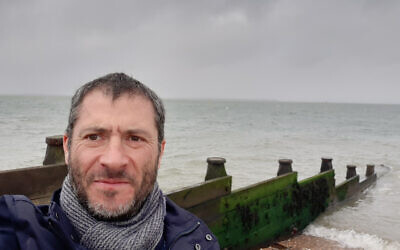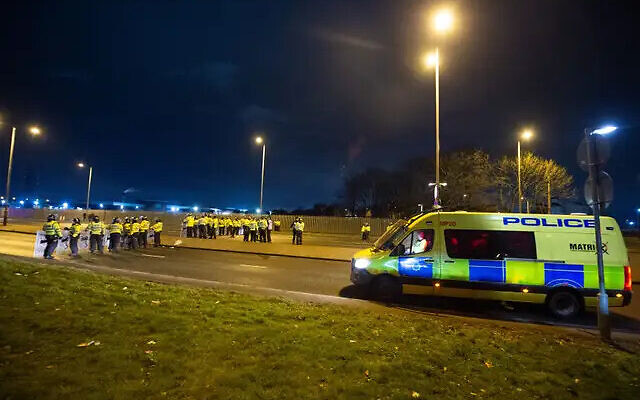‘Brutal’ lessons of Holocaust exposed amid fears for crisis-hit Europe
Eminent British historian Professor Dan Stone, author of The Holocaust: An Unfinished History, says the threat of genocide remains
A British historian has laid bare the “brutal” horrors of the Holocaust in a stark warning against the return of far right hate.
Professor Dan Stone, author of The Holocaust: An Unfinished History, said the ripple effect of the extermination of six million Jewish people in the Second World War was still being felt.
And nearly 80 years on, the threat of genocide remains as the world faces multiple crises including the climate emergency and war in Ukraine.

In an interview with the PA news agency, Prof Stone said: “Antisemitism remains a live issue. Racism is a live issue.
“I think the fault lines that have been created in the world now will exacerbate those issues, particularly the climate emergency.
“The growth in the number of climate refugees – which we can fairly confidently predict is going to happen in the coming decades – will obviously be instrumentalised by the far right. You can see this happening already.
“The attacks on migrants, the attack in Knowsley, the attempt by the far right to mobilise people against migrants, I think that’s only going to increase.”
He called for more “human solidarity” to solve the world’s problems rather than blaming minority groups.
“Genocide doesn’t happen because a couple of individuals wake up one morning and think, ‘Oh, I’m going to kill all the x, y, or z’. It happens as an unfolding of a dynamic process in society usually in times of crisis or warfare,” he said.
Prof Stone, who is director of the Holocaust Research Institute at Royal Holloway, University of London, said the Holocaust remains embedded in modern culture and something society “will never be done with”.
“We only have to think about Vladimir Putin talking about ‘de-Nazifying’ Ukraine as a pretext for invasion, to see that Holocaust memory continues to shape the geopolitics of the world that we live in,” he said.
“The rise of the populist right and Brexit, the climate emergency, all of these things shape the way that we see the world differently. That drives us to interpret the Holocaust differently.”
In his newly published book, Prof Stone sheds light on little-known facts and tackles common misconceptions that he said “urgently” needed to be corrected.
While the Holocaust concerned the persecution of German Jews by the Nazi regime from 1933, this group only account for about 5% of the victims, with most being in eastern Europe, he said.
“There are over a million of them whose names we still don’t even know because whole communities were simply wiped out.
“That also means that not only Germans were perpetrators. This is really crucial – everywhere that the Nazis went they found collaborators. The Holocaust is a continent-wide crime.”
It spread out as far afield as France, Romania, Norway, the Netherlands, Ukraine and Hungary, with perpetrators ranging from antisemitic ideologues to peasants looting their Jewish neighbour’s pots and pans, Prof Stone said.
He also dismissed the idea of German death camps as the epitome of “industrial genocide and efficient factory line killing”.
He said: “Auschwitz is the apogee of the death camp system that the Nazis built. But it doesn’t help if we only think in those terms.
“The whole process was much, much more brutal and shocking. It was an extraordinarily brutal and violent and horrific way to die. Extremely messy, visceral and unpleasant.”
He went on: “Secondly, the majority of the victims of the Holocaust were not killed in death camps.
“Half a million Jews starved to death or died of diseases in the ghettos in occupied Poland.
“About a million and a half were murdered by bullets, shot face-to-face outside the towns that they lived in in eastern Europe.
“Many others died on death marches and in other circumstances.”
With the exception of the Channel Islands, Britain was not directly affected by Nazi occupation but it was still “intimately involved” in the Holocaust story, Prof Stone said.
“The news about the killing of Jews filtered through to Britain through wire intercepts in 1941 onwards,” he said. “There was a huge amount of intelligence about what was going on in the Nazi camps and, of course, the British Army liberated Belsen so the British were deeply involved in almost all aspects of the Holocaust.”
Prof Stone accepted some people may feel “Holocaust fatigue” but said the targeting of a group of people for total extermination should “trouble any thinking person”, as should the persistence of paranoid antisemitic conspiracy theories.
He said: “Antisemitism is a variety of racism. The attack on Jews, as Jews, is no different from an attack on any other group of people.
“All that historians can do is to try to explain what happened, why the Nazis thought the way they did, and say that this is such a kind of crazed ideology that the continued existence of it in the world needs to be challenged.”
While the diverse voices of “extraordinary” survivors was important, Prof Stone warned against overlooking the consequences of mass killing.
And Holocaust commemorations can vary from the “kitsch” and “truly terrible” to deeply moving ones such as the memorial in Berlin to book burning on May 1 1933, he said.
Prof Stone said Holocaust education in schools should be reserved for older teenagers.
“If you want to teach young children the values of being nice to one another and not bullying and not saying racist slurs you don’t need the Holocaust to do that,” he said.
“It’s really only appropriate for older teenagers to tackle in a serious way.”
Learning about the Holocaust cannot make the world a “nicer” place, he said: “You have to create a nicer world first, and then people will be more receptive to the lessons of Holocaust education.”

Thank you for helping to make Jewish News the leading source of news and opinion for the UK Jewish community. Today we're asking for your invaluable help to continue putting our community first in everything we do.
For as little as £5 a month you can help sustain the vital work we do in celebrating and standing up for Jewish life in Britain.
Jewish News holds our community together and keeps us connected. Like a synagogue, it’s where people turn to feel part of something bigger. It also proudly shows the rest of Britain the vibrancy and rich culture of modern Jewish life.
You can make a quick and easy one-off or monthly contribution of £5, £10, £20 or any other sum you’re comfortable with.
100% of your donation will help us continue celebrating our community, in all its dynamic diversity...
Engaging
Being a community platform means so much more than producing a newspaper and website. One of our proudest roles is media partnering with our invaluable charities to amplify the outstanding work they do to help us all.
Celebrating
There’s no shortage of oys in the world but Jewish News takes every opportunity to celebrate the joys too, through projects like Night of Heroes, 40 Under 40 and other compelling countdowns that make the community kvell with pride.
Pioneering
In the first collaboration between media outlets from different faiths, Jewish News worked with British Muslim TV and Church Times to produce a list of young activists leading the way on interfaith understanding.
Campaigning
Royal Mail issued a stamp honouring Holocaust hero Sir Nicholas Winton after a Jewish News campaign attracted more than 100,000 backers. Jewish Newsalso produces special editions of the paper highlighting pressing issues including mental health and Holocaust remembrance.
Easy access
In an age when news is readily accessible, Jewish News provides high-quality content free online and offline, removing any financial barriers to connecting people.
Voice of our community to wider society
The Jewish News team regularly appears on TV, radio and on the pages of the national press to comment on stories about the Jewish community. Easy access to the paper on the streets of London also means Jewish News provides an invaluable window into the community for the country at large.
We hope you agree all this is worth preserving.






















